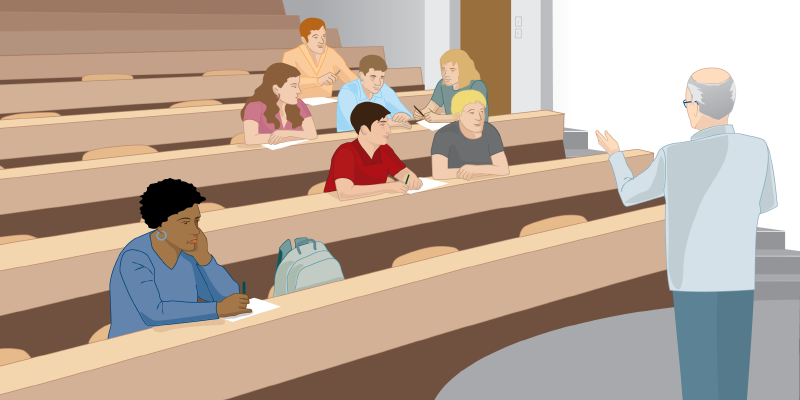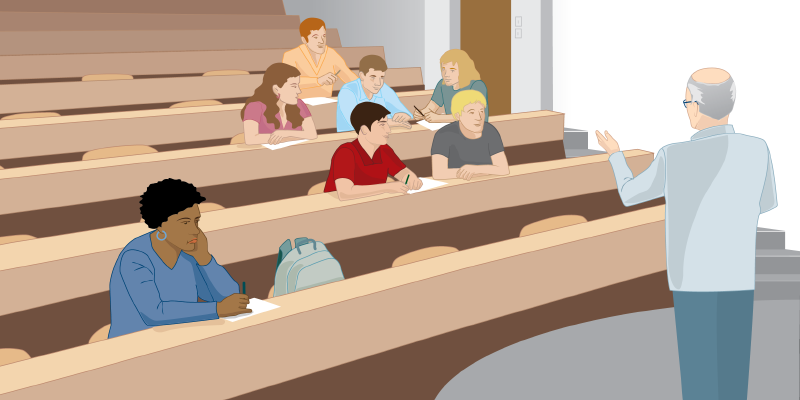Fairness is Still Missing in Physics Departments
Imagine growing up in love with science. In elementary school you begged your parents for science toys. In middle school you read everything science related that you could get your hands on. In high school you took all the advanced science, technology, engineering, and math (STEM) courses that you could—and you aced them. Along the way, you learned that physics was where your real passion lay so you went to college and entered your first physics class overflowing with confidence and excitement.
Now, in college you find that when you talk to your classmates, they mostly ignore you. They move away from you if you try to sit near them. They talk over you and dismiss your ideas when you work together. You find you are constantly questioned, made to prove your worth in every interaction despite getting high grades. You are treated as if you have nothing to contribute, as if you know nothing. You spend a lot of energy trying to figure out why. Your mental health suffers.
No one seems to notice or care about the experience you are having. You try talking to your professors, but instead of helping they suggest that you make more of an effort to make friends. Or they suggest that you find the center on campus that helps students like you. Maybe you are told you are being too sensitive or are misinterpreting what is happening. Maybe the professor asks you what you want them to do, because they don’t know what to do about it.
What if this experience was occurring in a department with a million-dollar grant to improve inclusivity, a department that prominently displays on its website its efforts to make its program fair for all, a department that has received accolades for all the work it has done. What if while your department is patting itself on the back for all the progress it has made, you tried to let the faculty know that your experience was terrible. But instead of being listened to, you were attacked and dismissed.
What would you do?
This question of what to do is one that many students in physics face. It is well established that the environment in physics is persistently unfair. Some people are given more opportunities to participate and thrive in the field, resulting in an overrepresentation of some demographics. This inequity is a loss to the field and an injustice that needs to be corrected.
Students that have the negative experiences described above often leave physics and are highly successful in another field. But they carry with them the trauma of their physics experience, which might manifest as self-doubt about whether their experience was somehow their fault, experiencing anger because deep down they know it was not.
Departments often attribute the loss of those students—if they notice it at all—to a lack of commitment or ability. In the next round of admissions, the faculty may lament that they aren’t getting enough applications from a diverse enough pool of students.
In my recent study [1], I describe how some physics instructors are unaware that some students are isolated by their peers. Often, the instructors fail to recognize the isolation that stems from cultural misogyny and racism. Even when they do notice that there is a problem, the instructors struggle to come up with productive ways to make their classrooms fairer and more welcoming for everyone.
The instructors in my study cared about fairness and were often already taking action to make their departments and programs more welcoming and supportive for all students. If you have read this far, you are probably a lot like them. And just like them, you probably are inadvertently doing things that maintain the unfairness. It is what we all do without conscious, intentional, and sustained effort to do otherwise.
Physics departments should take responsibility for how students are treated in their departments. They should provide their faculty and staff with the motivation and tools they need to do the hard and continuous work of recognizing behaviors and structures that lead to unfair treatment. Then they need to provide mechanisms for their instructors to productively address that unfair treatment. It is time to stop blaming people and structures outside of the control of the department (such as the K–12 system) or assuming that because you have good people in your department then you do not have a problem [2].
Departments also need to stop using the excuse that they do not know what to do. There is ample information in the literature about how to improve departments. Yes, the fixes can be slow and implementing them hard; it takes a commitment to fairness from the department and a sustained effort to make changes.
Departments and individual instructors can start by bringing the same attention to solving the problem of unfairness in your department that you do to solving an open problem in scientific research. Read the literature and hire consultants to develop the expertise needed. Take data to know how the department is doing. Are there students like the one described above? The answer is very likely yes. Plan and implement interventions based on expert understanding of the data that has been collected. Continue to collect data so that you know if your intervention is having an effect. Change your intervention using what you learn. Keep doing this until your data shows you have a department in which everyone can equally thrive.
Make these changes with urgency—there are very likely people currently experiencing harm in your department. Do not spend years forming committees that have discussions while the harm continues. Now is the time for your department to take responsibility to move beyond talking and planning. It is time to act.
References
- M. Dancy, “Majority group physics instructors struggle to notice, name, and disrupt racist and sexist student interactions,” Phys. Rev. Phys. Educ. Res. 21, 010142 (2025).
- M. Dancy and A. K. Hodari, “How well-intentioned white male physicists maintain ignorance of inequity and justify inaction,” IJ STEM Ed 10, 45 (2023).





